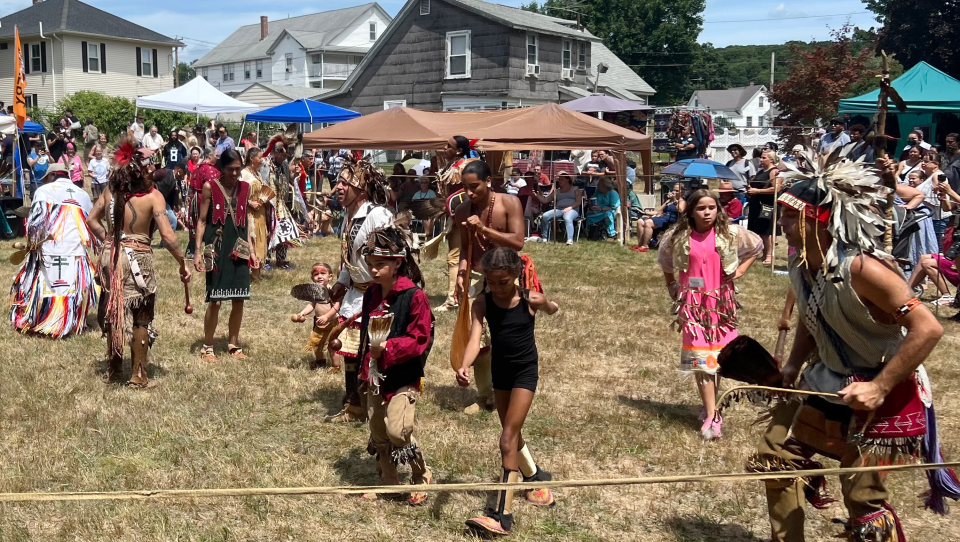A Massachusetts commission is considering proposing criteria for the state to certify Native American tribes for the first time.
That idea was greeted with a litany of criticism from activists at a meeting Monday, with many frustrated by the idea that the state would essentially be deciding who is and who is not American Indian.
Members of the Commission on Indian Affairs said the state has to have some kind of standard for certifying tribes in order to distribute federal money that is designated for qualified Native American populations.
“We’ve been trying to avoid this for a long time,” said the commission’s executive director, John Peters, who is a Mashpee Wampanoag member. But now, “I guess it’s time that we start trying to come up with some type of criteria and that we can live with and pass it on to the Legislature.”
After this story published, Commission Chair Troy Phillips reached out to GBH News to emphasize that the commission would not challenge or question any individual’s Native ancestry. The goal is instead to establish “a criteria for the commonwealth similar to other states that will be the requirements of what a tribe is” so they can be formally recognized by Massachusetts, he said.
Massachusetts has never had a formal certification process for tribes. The only government list that exists is an executive order issued by Gov. Michael Dukakis in 1976. It declared that “State agencies shall deal directly” with three specific tribal councils: the Mashpee Wampanoag Indian Tribal Council; the Wampanoag Tribal Council of Gay Head; and the Hassanamisco Nipmuc Tribal Council.
“Recently, we received a communication from a state agency asking us to identify Native communities that qualified for government-to-government relationships with the state of Massachusetts,” Michael Wagner, one of the body’s commissioners, explained Monday.
Wagner didn’t say which agency made the request. Several state agencies are offering new funding opportunities for tribes. For example the Mass Cultural Council has released a new “Native American & Indigenous People’s Equity Plan.” One element of the plan is to, “in partnership with the Massachusetts Commission on Indian Affairs, review and update the BIPOC or Native American and Indigenous Centered self-identification process to ensure it is equitably serving Native American/Indigenous led organizations doing work as part of the creative sector.”
And the Executive Office of Energy & Environmental Affairs is offering grants up to $750,000 to help tribes buy land to preserve as open space or farming — once they provide “documentation of eligibility as [a] Massachusetts tribal government.”
Several activists in the meeting said the Commission should not be issuing criteria for recognizing tribes.
“This is how the dominant culture has consistently gotten the upper hand and kept us apart from each other,” said Elizabeth Solomon with the Massachusetts Tribe at Ponkapoag. “I would really, really think it would be terribly ironic if what this commission did was to continue that process.”
Wagner and other commissioners said the commission itself has no authority to issue new certification standards, or include new tribes. So he proposed “that the commission will have a written communication for state agencies explaining that currently there are three tribes that have government to government relationships with the state of Massachusetts.”
Melissa Ferretti, chairwoman of the Herring Pond Wampanoag — a tribe not recognized in the executive order — objected.
“I’m just getting increasingly frustrated having that executive order be constantly used as a weapon against the tribes that were not specifically mentioned in there,” Ferretti said. “How many times and how often do we have to get humiliated and kicked down the ladder?”
The commissioners floated the possibility of convening a broader conversation among Native American groups to hash out acceptable criteria or language, but ultimately made no conclusions.
Peters told GBH News in an email that, after the public portion of the meeting, the commissioners “reflected on what was said during the meeting and a letter will be generated explaining the need for the process. In the near future, another meeting will be called to venture into next steps.”
But Peters also told GBH News, “If you had lived our history, you would know why the conversation has always been difficult.”





